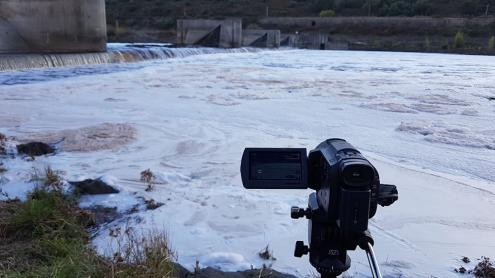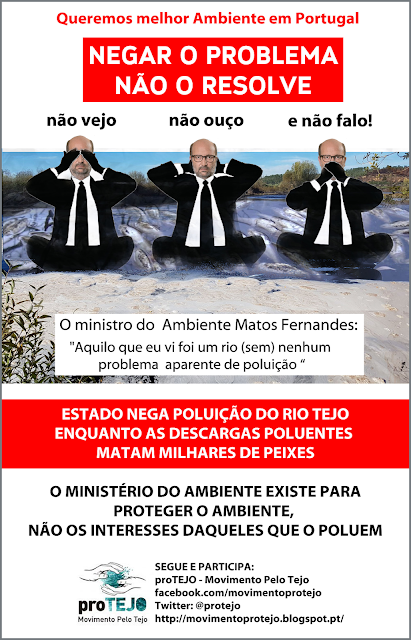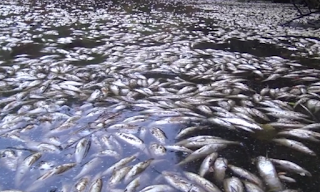 Pulp mill operator, Celtejo, has demanded €250,000 in compensation from the environmentalist who pointed out the fact that the pollution levels in the waters of the Tejo, downriver from the industrial plant at Vila Velha de Rodão, were unaccaptable as millions of fish had been killed. (here)
Pulp mill operator, Celtejo, has demanded €250,000 in compensation from the environmentalist who pointed out the fact that the pollution levels in the waters of the Tejo, downriver from the industrial plant at Vila Velha de Rodão, were unaccaptable as millions of fish had been killed. (here)
The environmentalist, Arlindo Consolado Marquês, today said he was "very sad and very shaken" after Celtejo had instituted a defamation process, for associating the company's name with pollution levels in Rio de Janeiro.
In the petition, filed in the Court of Santarém, Celtejo demands €250,000 from Arlindo Marquês for damages "against the good name of the company," and huffily complains of "statements that are intended to generate in the public opinion the idea that the author (Celtejo) is responsible or co-responsible for the alleged pollution of the Tejo River. "
Speaking today to Radio Portalegre, Arlindo Marquês, who is an active member of the proTejo movement, said he highlighted the "pollution of the Tagus as an act of citizenship."
The prison guard turned environmentalist, known locally as 'the Guardian of the Tejo,' hit back at the company, accusing Celtejo’s management of "psychological terrorism" and of trying to silence him with its defamation case.
Despite feeling persecuted, Arlindo Marquês said he is not afraid and that he will continue to denounce pollution in the river Tagus, arguing that Celtejo should really be compensating those families who had their livelihood linked to the river Tejo which the compoany so readily pollutes.
According to proTEJO, the origin of the pollution that killed millions of fish in the Vila Velha de Rodão area is from three companies, Celtejo being the worst offender.
In November, Marquês said, "We all know that the culprit is the pulp mill, everyone already knows this," referring to the emissions of effluents by Celtejo - Empresa de Celulose do Tejo, S.A., which produces Bleached Eucalyptus Kraft Pulp (BEKP) for paper production.
The 90-page indictment contains images from social media and copies of news items and interviews that Celtejo considers defamatory.
"Over the last few months, the defendant has repeatedly been saying, through platforms that facilitate their disclosure, statements that undermine the author's good name, credibility and prestige," reads the indictment.
With the corporate purpose of producing and marketing cellulose pulp and its derivatives or related products, Celtejo states that its "economic activity is guided by criteria of sustainability and environmental preservation, as well as by strict quality certification."
Portugal’s animals and nature party, PAN, already has filed a complaint with the Public Prosecutor's Office for Celtejo’s pollution in the Tejo after several councils complained that the situation was utterly appalling.
For PAN, the activity of Celtejo and other factories that are polluting the river, should be suspended as they are committing environmental crimes every time they flush.
PAN also has accused the Ministry of the Environment of "indifference" to the situation." We are facing a serious environmental crime that is leading to the ruin of the Tagus River," said André Silva.
Portugal's Environment Minister managed to drag himself to the area and said that he saw no dead fish, so concluded that everything was perfectly legal - shown in a blog posting below.
Celtejo is suing the environmentalist for complaining about pollution levels which may be perfectly legal as it has a government-issued ‘polluter’s licence,' granted by the Portuguese Environment Agency in a deal whereby the company undertook to build a waste water treatment plant to treat effluents produced by itself, nearby industries and the local council. This 'licence to pollute' was granted by the very State agency that is supposed to be protecting Portugal's environment.
Should the bullying by Celtejo of an environmentalist ever come to court, the judge may well concluse that Celtejo has no 'good name' to defend and allow Marquês to continue to complain abouthe poisons being dumped into the Tejo that kill fish and other river life.
Meanwhile, the authorities in Brussels and Lisbon continue to enable Celtejo to operate to the detriment of one of Portugal's finest rivers, dumping industrial waste that is poisoning the water - with environmentalists - and now others - wondering how this can be seen as 'a good thing?'

'Nothing to do with us , Guv' - the Tejo pollution must be coming from somewhere but Celtejo claims its practices follow criteria odf "sustainability and environmental preservation."

http://movimentoprotejo.blogspot.pt/


The environmentalist, Arlindo Consolado Marquês






















